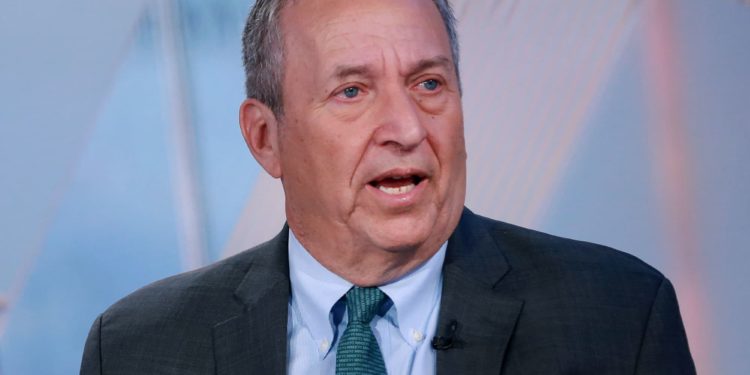Former US Treasury Secretary Larry Summers has called on wealthy nations to consider debt restructuring for African countries.
In an interview with the Wall Street Journal, Summers revealed that most poor countries are indebted to China, and have been unable to move in terms of development due to the debt burden.
“Sad to say, right now the world needs comprehensive debt relief for the poorest countries. What the world is getting is grudging, incremental, partial, limited small efforts and we’ve got to get a way to do better. A lot of that debt is owed to China. Finding a way to help these countries move forward is going to be necessary and profoundly important for a large number of human lives,” Summers said.
In mid-August, China’s Ministry of Foreign Affairs promised extensive debt relief for some of the world’s poorest countries. China, through Wang Yi, Beijing’s senior diplomat, revealed that it would not demand payments for concessional loans that in the recent past had reached maturity but that 17 African states had failed to pay off.
Read: Debts Repayment Consumes Half Of Revenue In Three Months Of 2022/2023
According to Cytonn Investments CEO Edwin H. Dande, African Presidents need to take immediate action in asking for a restructuring of their loans with other nations. For Kenya, Dande says that President William Ruto should shy away from imposing measures that will see Kenyans overtaxed, but instead go for debt restructuring.
“African Presidents need to be bold and act now as Larry Summers has suggested. This is an opportunity for President Ruto to take the lead and act boldly: rather than taxing more of an already overtaxed Kenyan, just face China and seek a restructuring. It’s better than running a zombie economy that can only pay salaries and service debt,” Dande wrote.
According to the United National Economic Commission for Africa (UNECA), Africa’s debt-to-GDP ratio has increased from 57 percent in 2019 to 66 percent in 2022.
“The COVID-19 pandemic and The Russia-Ukraine war have negatively affected the fiscal performance of African countries, where the debt-to-GDP ratio has increased from 57% in 2019 and by 2021 it was to 66% in 2022,” UNECA Director of the Macroeconomics and Governance Division Mr Adam Elhiraika said in October 2022.
Read: NMS Hands Over Ksh100 Billion Debt To Sakaja Administration
According to the Central Bank of Kenya (CBK), Kenya’s public debt as of December 2021 was Ksh8.2 trillion, with external debt hitting Ksh4.2 trillion as compared to an internal debt of Ksh4 trillion.
It is estimated that Kenya paid an extra Ksh5.4 billion in external debt servicing in the year ended June due to a weak Kenyan Shilling even as the situation gets worse.
Days after assuming office, President Ruto announced adjustments that would see the government ramp up revenue collection in its race to meet a Ksh6 trillion collection target by 2027.
The move has seen the government through Kenya Revenue Authority (KRA) embark on tax reform measures that could see every Kenyan above 18 years brought into the tax bracket.
The President said he would like to create a more independent country that does not have to depend on external borrowing.
“We need to pay taxes so that we can get resources for development projects and also be able to repay the debt that we have as a country. We intend to cut on borrowing but we must increase the revenue we collect to be able to undertake development,” President Ruto said on October 30, 2022, while speaking in Kenol, Murang’a county.
Read: President Ruto Implores IMF, World Bank To Offer Covid-19 Related Debt Relief
“There are only seven million people with KRA PIN. In the same economy, Safaricom’s M-Pesa has 30 million registered customers, transacting billions daily. The fact that this opportunity remains unclear to KRA demonstrates why radical changes are necessary,” Ruto added.
Currently, for every Ksh100 the government collects, about Ksh60 is spent on debt repayment, while most of the remaining is spent on recurrent expenditure.
Recently, the Ghanaian government began to restructure its debt with local creditors, encompassing about $10.7 billion (Ksh1.3 trillion) in government bonds. The restructuring initiative, announced by the finance ministry on December 5, offers to swap old bonds for new debt, paying 0% interest in 2023. The coupon would rise to 5% in 2024 and 10% from 2025 to 2032.
The finance minister, Ken Ofori-Atta, said last month that the country owed 450 billion cedis (USD Ksh4.9 trillion). The IMF estimates “general government gross debt” at 90.7% of GDP for 2022. Fitch Ratings, which downgraded Ghana’s debt to a CC rating in September, said that debt payments came to 54% of revenue in the first half of 2022.
Email your news TIPS to editor@thesharpdaily.com


















